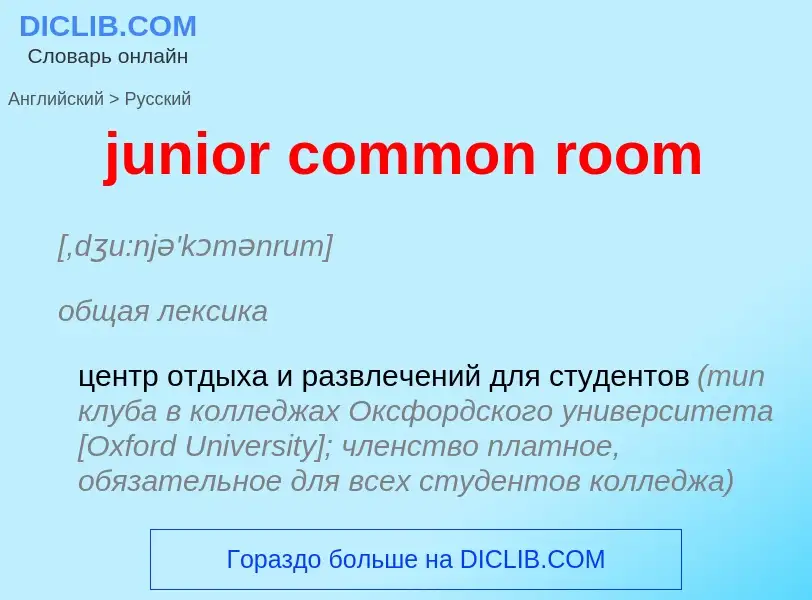Translation and analysis of words by ChatGPT artificial intelligence
On this page you can get a detailed analysis of a word or phrase, produced by the best artificial intelligence technology to date:
- how the word is used
- frequency of use
- it is used more often in oral or written speech
- word translation options
- usage examples (several phrases with translation)
- etymology
junior common room - translation to russian
[,dʒu:njə'kɔmənrum]
общая лексика
центр отдыха и развлечений для студентов (тип клуба в колледжах Оксфордского университета [Oxford University]; членство платное, обязательное для всех студентов колледжа)
[,si:njə'kɔmənrum]
общая лексика
профессорская (в Оксфордском университете [Oxford University])
Definition
Wikipedia

A common room is a group into which students (and sometimes the academic body) are organised in some universities, particularity in the United Kingdom, normally in a subdivision of the university such as a college or hall of residence, in addition to an institution-wide students' union. They represent their members within the hall or college, operate certain services within these institutions such as laundry or recreation, and provide opportunities for socialising. There are variations based on institutional tradition and needs, but classically the following common rooms will exist:
- A junior common room (JCR) – for undergraduate students
- A middle common room (MCR) – for post-graduate students (in colleges with a large number of post-graduate students)
- A senior common room (SCR) – for academic members of the college
Common rooms are particularly found at collegiate universities such as Oxford, Cambridge, Durham, York and Lancaster, but can also be found (often only the JCR) at non-collegiate universities, where they are normally associated with halls of residence. A significant difference between colleges and halls of residence generally is that students continue to be members of a college when not resident in the college; thus college JCRs serve all students who are members of the college, whether or not they live in college accommodation, while hall JCRs serve only residents of that hall.
As well as in the UK, organisations known as common rooms are found in universities in Australia, Ghana, Ireland, Singapore and the US In addition to this, each of the above terms may also refer to an actual common room designated for the use of these groups, and at some universities has only this meaning. At the University of Cambridge, the term combination room (e.g., "junior combination room") is also used, with the same abbreviations.

![Keble College]], [[University of Oxford]], England Keble College]], [[University of Oxford]], England](https://commons.wikimedia.org/wiki/Special:FilePath/Keble SCR.jpg?width=200)
